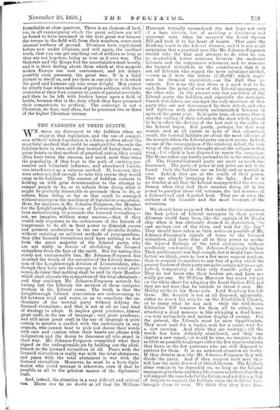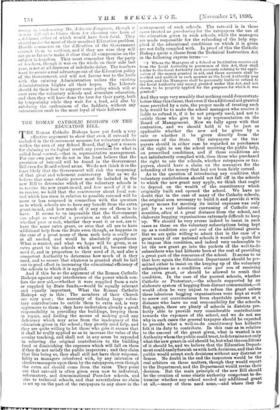THE FADDISTS AT THEIR ZENITH.
WE mean no disrespect to the faddists when we suggest that legislation, and the use of compul- sion without which legislation is a farce, is often about the most fatal method that could be employed for the ends the faddists have in view, and that instead of fixing their san- guine hearts on that method of practical action, they would often have twice the success, and much more than twice the popularity, if they kept to the path of exerting per- suasive and voluntary influence, and abandoned legisla- tive interference as a ruinous method. If, however, they were sober-minded enough to take this course they would cease to be faddists. The essence of faddism consists in holding on with grim determination to the attempt to compel people to do, or to refrain from doing, what it might be perfectly reasonable to persuade them to do, or refrain from doing, so far as that could be managed without seizing on the machinery of legislative compulsion. Here, for instance, is Mr. Johnson-Ferguson, the Member for the Loughborough division of Leicestershire, who has been endeavouring to persuade the licensed victuallers,— not, we imagine, without some success,—that if they would only acquiesce in the endeavours of the friends of temperance to do all in their power to diminish excess and promote moderation in the use of alcoholic drinks, without insisting on militant methods of propagandism, they (the licensed victuallers) need have nothing to fear from the great majority of the Liberal party, who are not really in favour of abolishing the licensed victuallers from the face of the earth. But for taking this surely not unreasonable line, Mr. Johnson-Ferguson has incurred the wrath of the executive of the Liberal Associa- tion of the Loughborough division of Leicestershire, who, though they have not the courage to insist on total absti- nence, do insist that nothing shall be said by their Member which shall alienate the sympathies of the total abstainers ; and they condemn Mr. Johnson-Ferguson severely for having lost the Liberals the services of these energetic workers in the Liberal cause. The truth is that the Loughborough Liberal Association are endeavouring to hit between wind and water, so as to conciliate the en- thusiasts of the teetotal party without defying the licensed victuallers ; and that is not at all an easy kind of strategy to adopt. It implies great prudence, almost great craft, in the use of language ; and great prudence, and still more great craft in the use of language is quite certain to involve a conflict with the enthusiasts in any crusade, who cannot bear to pick and choose their words with care and caution when their hearts are aflame with indignation and the desire to denounce all who stand in their way. Mr. Johnson-Ferguson committed what they regard as the unforgiveable sin by holding out the olive- branch to the licensed victuallers at all. Peace with the licensed victuallers is really war with the total abstainers, and peace with the total abstainers is war with the licensed victuallers. Moreover, he must be a born diplo- matist who could manage it otherwise, even if that be possible at all to the greatest master of the diplomatic craft.
And, indeed, the situation is a very difficult and critical one. Where can be no doubt at all that Sir William Harcourt virtually surrendered the last hope not only of a bare victory, but of avoiding a diststrous and universal rout, when he accepted the Local Option Bill and took it to his heart of hearts. That gave the finishing touch to the Liberal disaster, and it is not at all surprising that a practical man like Mr. Johnson-Ferguson should take the hint and attempt to do what he can to re-establish better relations between the moderate Liberals and the temperance reformers, and to reassure the licensed victuallers in the constituency that it is not all Liberals who regard the mere substance alcohol, —even as it were the letters (C,H2OH) which repre- sent its chemical equivalent,—as the Evil One in- carnate. But none the less there is a good deal to be said, from the point of view of the Liberal managers, on the other side. In the present very low condition of the Liberal party the faddists, and especially the root-and- branch teetotalers, are amongst the only members of that party who are not discouraged by their defeat, and who will fight-on with absolutely undiminished heroism in spite of the great rcut. It is quite true, of course, that it was the nailing of their colours to the mast which proved to be in effect the driving of the last nail in the coffin of the Liberal hopes. But partly, perhaps, for that very reason, and at all events in spite of that calamitous result, the teetotal faddists are about the most efficient of the recruits whom the Liberal party can now secure. Indeed, as one of the consequences of the crushing defeat, the very wing of the party which brought about the collapse is that wing cf it which is best disposed to renew the campaign. The Home-rulers can hardly pretend to be in the running at all. The Disestablishment party are quite as much dis- heartened. The party of peace at any price are not to be found. Only the faddists are as lively and as martial as ever. Indeed, they are at the zenith of their power. They are already stripping for the fight. And it is no wonder at all that the Liberal managers feel the utmost dismay when they find their member doing all in his power to paralyse these old veterans, the last resource of a disheartened and dejected host. They are at once the authors of the disaster and the most buoyant of the volunteers.
We should have supposed that under the circumstances the best policy of Liberal managers in their present dilemma would have been, like the captain of St. Paul's ship when it was obviously doomed to destruction, "to cast anchors out of the stern, and wait for the day." They should have taken as little notice as possible of Mr. Johnson-Ferguson's signals of truce to the licensed victuallers, and have done all in their power to soothe the injured feelings of the total abstainers, without needlessly condemning Mr. Johnson-Ferguson's tactics. Their predicament was bad enough, but it would have been better, we think, even to lose a few more earnest workers, than to commit themselves to any line of policy which the present leaders of their party are quite certain not to accept. Indeed, temporising is their only feasible policy now. They do not know who their leaders are, and have not really got any. Sir William Harcourt has never yet put on the white sheet for adopting the Local Option Bill, and they are not sure that he intends to throw it over. Mr. Morley sticks to his Home-rule. Lord Rosebery has left them. Mr. Asquith is not at all disposed, apparently, either to renew his attacks on the Established Church, or to unsay what he has said. Only the withdrawn Education Bill remains for them all to attack, and attacking a dead measure is like whipping a dead horse, —a very melancholy and useless display of energy. For the present, the Liberals must be mere Opportunists. They must wait for a leader, wait for a cause, wait for a new opening. And while they are waiting,—till the wreck has been definitely abandoned, and they can charter a new vessel,—it would be wise, we imagine, to do as little as possible to alienate either the few representatives they have, or the few partisans who are still disposed to canvass for them. It is an awkward situation no doubt. If they dismiss men like Mr. Johnson-Ferguson they will divide the party. And if they support such men they will lose the most devoted of their followers. The faddists alone remain to be depended on, so long as the Liberal managers give them anything like reason to believe that they will support the sane fads for the future, and yet it is a policy of despair to support the faddists when the faddists haw) brought them to ruin. We think that they have dono wrong in condemning Mr. Johrftou-Ferguson, though it is very difficult to blame them for choosing one horn of a dilemma either of which would have been fatal. They should make the most of their unsolved Education problem. Hostile comments on the difficulties of the Government coinniit them to nothing, and if they are wise they will not go so far as to make it clear that all compromise on the subject is hopeless. They must remember that the party of teachers, though it was on the whole on their side last year, is not at all desirous of indefinite delay. The teachers want to secure a real advantage out of the Education policy of the Government, and will not favour war to the knife with the existing Administration unless the existing Administration blights all their hopes. The Liberals should do their best to support some policy which will at once save the voluntary schools and stimulate education, and then they will have done the best for their party, both by temporising while they wait for a lead, and also by subduing the enthusiasm of the faddists, without any ostentatious snub to the most loyal of their followers.











































 Previous page
Previous page